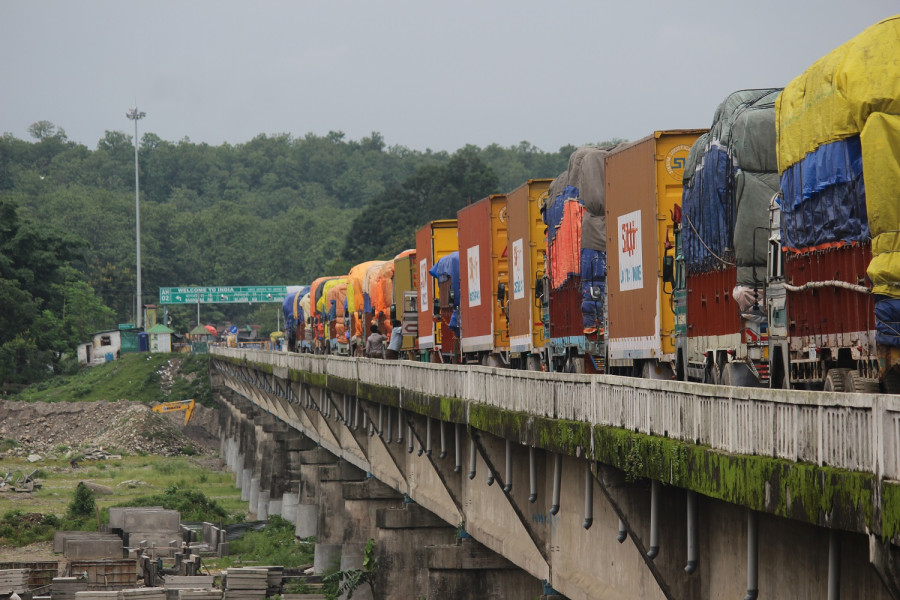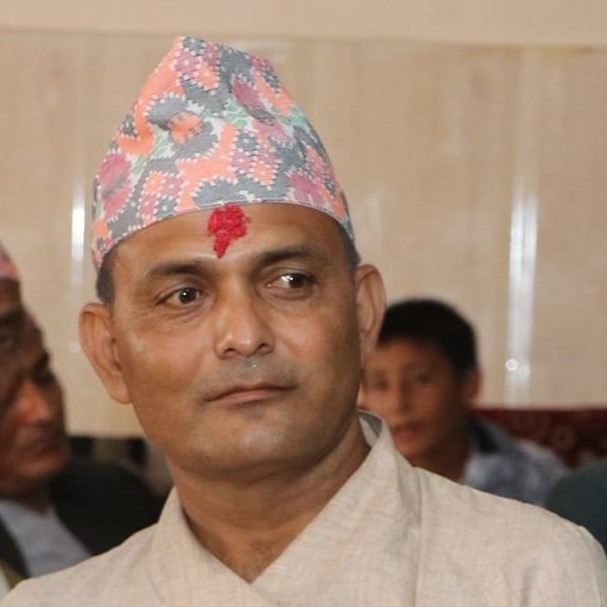Money
India continues to halt the movement of Nepali cargo trucks at Panitanki border point
Over twenty trucks carrying Nepali tea and large cardamom have been stranded over the bridge of the Mechi River for the past five days.
Parbat Portel & Binod Bhandari
The state government of West Bengal in India has halted the movement of Nepali cargo trucks from the eastern border point of Kakarvitta for the past five days and show no sign of letting them through. Other border points have been allowing Nepali cargo trucks to pass through unhindered.
The West Bengal Police, however, has allowed the crossing of trucks loaded with broom grass exported to Bangladesh and two trucks carrying large cardamom heading to New Delhi directly on Thursday, according to traders.
Except for three cargo trucks, 22 trucks — 14 carrying tea and 8 carrying large cardamom — remain stranded over the bridge of the Mechi River, according to the Mechi Customs Office.
Traders said that the crossing has not been allowed by the West Bengal police citing orders from “upper levels”.
"Three trucks were allowed to cross the border on Thursday as they were heading to Delhi and Bangladesh," said a customs agent. He added that export of tea has been stopped completely.
Dhruvaraj Bishwokarma, chief of the customs office in Kakarvitta, said that the Indian police have informed them that they have been issued orders from the state government of West Bengal not to permit the passing of Nepali goods.
Nepali authority said that the central government of India had directed the Panitanki Customs to continue international border trade with Nepal, Bhutan and Bangladesh even during the lockdown. But traders alleged that the West Bengal police have violated the instructions of the central government.
"Indian customs are allowing the crossing of trucks but the West Bengal police are halting them. It's difficult to understand the dual policy of the Indian government," said another customs agent, who wished to remain anonymous.
Uday Chapagain, a tea entrepreneur, said that the central government of India has written a letter to the Nepal government to allow hassle-free trade movement from Nepal to India, Bangladesh and Bhutan. “But the decision of the West Bengal government is different.” "It’s against the Nepal-India trade agreement," he said.
India has also halted the movement orthodox tea that is exported to third countries, he said.
Before the lockdown, Shanta Chettri, a member of parliament of West Bengal Rajya Sabha from Darjeeling had demanded an immediate halt of Nepali tea into India, citing that Nepali tea is not of good quality and unhealthy.
Years ago, the Darjeeling Tea Association had also requested the then Indian President Pranav Mukharjee to stop the import of Nepali tea by submitting a memorandum when he visited Darjeeling.
There have been several attempts from Darjeeling to stop the import of Nepali tea.
According to Suresh Mittal, president of the Nepal Tea Producers' Association, Jhapa, Indian traders have created unnecessary confusion about Nepali tea in India. According to him, Nepali tea is neither inedible nor of poor quality. It is tested at the Central Food Laboratory in India.
Some Indian traders have been exporting Nepali tea to third countries under the Darjeeling Tea brand.
Orthodox tea from Ilam tastes better than Darjeeling, Nepali traders claim. The geographical structure and weather conditions of Darjeeling and Ilam are nearly identical. That is why Ilam tea is better than Darjeeling, traders said. "The taste of tea produced in the upper part of the country, including Ilam, is different from that of Darjeeling," they said.
Bishnu Bhattarai, executive director of the Nepal Tea and Coffee Development Board, said that they have already informed the Ministry of Industry regarding the restriction of export by the West Bengal government. “But so far, there is no concrete initiative taken by the ministry.”
Tea is also one of the key exportable Nepali products. According to the Mechi Customs Office, tea worth Rs4 billion is being exported to India annually.
The demand for CTC tea produced in Terai is high in India. Nepal has been enjoying zero-tariff facility especially on agricultural products like tea, ginger, large cardamom, broom, and lentils.
India has been marketing Nepali products as its own, under the Darjeeling tea brand and sending them to countries like Europe and the US, according to Nepali traders. "India buys Nepali tea at a cheaper rate and sends it to third countries at a high price," said a tea trader. "As we do not a brand for Nepali tea, it is difficult to export tea to other countries," he said
Though India has been obstructing the export of Nepali products through other customs checkpoints of the country, it has not affected the Jogbani checkpoint. According to the Biratnagar Customs Office, there are no hassles while exporting Nepali agricultural commodities like jute products, refined sunflower oil and orthodox tea.
Gopi Upreti, a customs officer, said that except for processed palm oil, other Nepali products are being exported smoothly. Nepali products worth Rs4.35 billion have been exported from Jogbani in the current fiscal year as of Saturday.




 8.54°C Kathmandu
8.54°C Kathmandu















